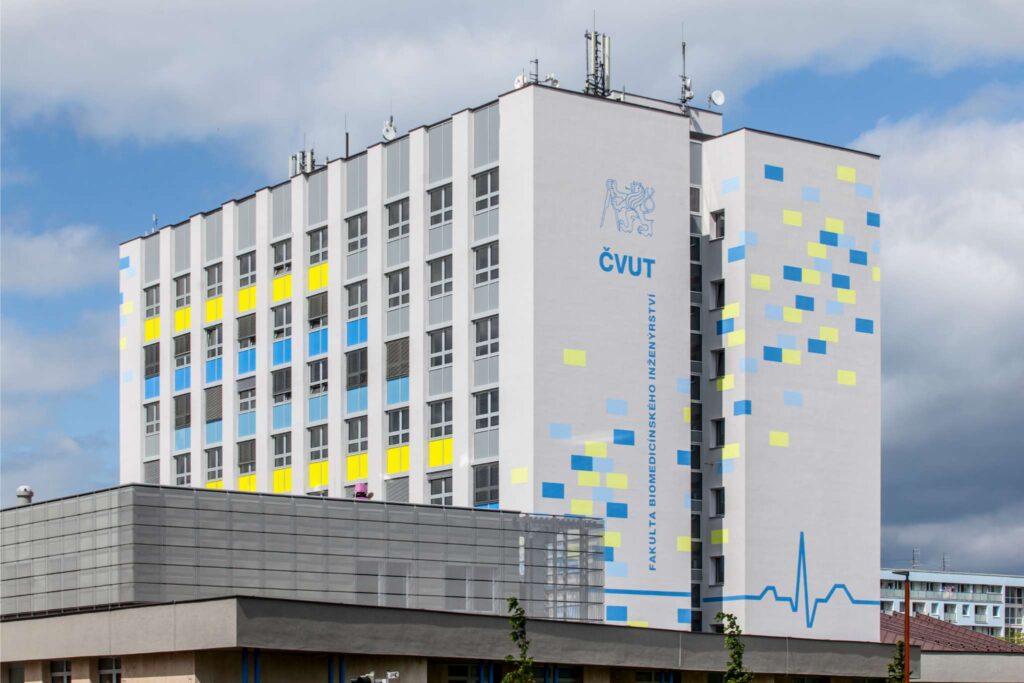
Czech Technical University in Prague, Faculty of Biomedical Engineering
General description
The Faculty of Biomedical Engineering is the second youngest faculty of the Czech Technical University (CTU) in Prague and was established in 2005. In 2023 was the whole faculty evaluated as the third within the Czech Technical University regarding the scientific outcome based on the number of d1, Q1 and Q2 published papers related to the number of employees. Selected Research teams obtained significant international awards as for example Corovent (lung ventilator for emergency use), metamaterials used for aplicators within hyperthermia, application of modeling and simulation used within the clinical medicine, 3D printing in medicine, UWB radar for clinical usage, and others. There is a long history of activities within the telemedicine projects and applied scientific results also. Faculty has a lot of utility models and patents.
Key Research Facilities, Infrastructure and Equipment
- scientific apparatuses
- medical devices and educational sets and tools, i.e. simulated workplace of ICU including the whole body clinical simulator
- set of different 3D printers for different materials
- complete facilities for the implementation of preventive maitenance of the majority of medical devices used at ICU
- specialised clean rooms for nanotechnology processes
- specialized microscopes including AFM
- scientific devices for diamond like carbon layer depositions
- different lasers
- complete facilities for design and production of prototypes with respect to the microwave technology
- medical devices and telemetry with respect to the diabetes
- set of modelling and simulation softwares
- experimental sets for X-ray experiments, a lot of simulators and testers for different medical sciences and robotic medical devices for therapy
Contact person
Contact us to know more about our location and work environment. Please use the main contact for questions related to administrative matters. Please contact the supervisors/group leaders of respective research groups regarding feasibility of your research proposal with regard to the research group activities.

Your future supervisors

Jan Mužík

Jan Mužík
I am the head of Medical software research group at the Faculty of Biomedical Engineering, Czech Technical University and 1st Faculty of Medicine, Charles University, an associate professor at both universities and a founder and CEO/CIO of 4 university spin-off/startup medtech companies. I am currently a supervisor of 6 PhD. students and has been supervisor of successful 13 bachelor or master theses. I participated in or led over 20 research projects and have international working experience in the USA, Finland and Norway. I participated in over 100 research results (journal and conference papers, patents, utility patents etc.). I have over 20 years’ experience in design and implementation of software for healthcare and in the last 15 years I was mostly focused on design and development of telemedicine software systems and their use in clinical studies. I am leading the team that created Protectu mobile assistance service and Diani telemedicine system.
About the position
The postdoctoral fellow will join the Medical Software Research Team at the Department of Information and Communication Technologies, Faculty of Biomedical Engineering, Czech Technical University. Postdoctoral fellow will participate in:
Research, design, implementation, and testing of IoMT and mHealth tools
Designing and execution of clinical studies especially studies focused on use of telemedicine in chronic diseases.
Teaching courses focused on software engineering and use of software tools in medicine.
Publishing research results in journals and presenting them in conferences.
Collaborating with partners mostly from European countries.

Karel Hána

Karel Hána
I am the author or co-author of seven patents granted in the last 5 years: Unit for non-invasive stimulation of visual cortex cells in severe visual impairment (2022, patent no. 309083), Method for wireless connection of a smart house with an emergency patrol system and a system to implement it (2020, 308531), Monitoring and transport system especially for transporting infectious patients (2019, 307932), Surveillance device for monitoring people, especially in difficult conditions, and a system for deploying sensors on the human body (2019, 307930), A method for three-stage communication of a notification center and a warning end-effector (2019, 307931), A reclining chair for vacuum-compression therapy (2019, 308065), A reclining device for a rehabilitation robot (2018, 307670).
About the position
The successful candidate will be based at the Department of Information and Communication Technologies in Medicine (KIT). The Postdoctoral fellow will join the research team Rehabilitation process quantification that is focused on monitoring and quantifying the process of rehabilitation care for patients with focal brain injury using elements of virtual reality, mobile applications and telemedicine systems and that is working to find solutions to different challenges in the field of technologies for the rehabilitation of patients with balance disorders or other related difficulties. The key research infrastructure and equipment of this research group include the Laboratory of personalized telemedicine in Buštěhrad, where a smart apartment is available. The fellow may also liaise with international collaborators, e.g. Medical Informatics & Telemedicine Group, Department of Computer Science, Faculty of Science and Technology, University of Tromsø – The Arctic University of Norway through international secondments or have the opportunity to carry out secondments in the non-academic sector, in cooperation with our industrial partners, e.g. MagicWare, s.r.o.
Given the main focus of our research group, the expected outputs of the fellowship are high-level applied research outputs such as patent applications, market validations, new collaboration with industry and collaborative research projects. Potential areas of knowledge of the applicants that can be a good fit for our research group. PhD in Discrete mathematics, Computer Science or in a related field. Additional knowledge or experience the applicant would be good to have. Programming languages UML/SQL/HTML, statistical methods applied to bioinformatics. Personal characteristics are good to have. Work and think independently with a proactive attitude, prone to problem solving







